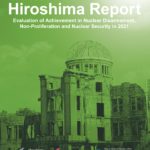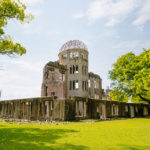5. The United States ■Nuclear-Weapon State
| Nuclear Disarmament | 14.9 Points | Full Points 101 | 14.8% |
| Change compared to the Hiroshima Report 2021:+0.8 | |||
| The U.S. is estimated to possess 5,550 nuclear warheads, the second largest NWS next to Russia, and continues to dismantle retired warheads. It continues its nuclear modernization program. The U.S. reached an agreement with Russia on the five-year extension of the New START. At the U.S. – Russian summit meeting, they reaffirmed the principle that “a nuclear war cannot be won and must never be fought.” They also agreed to convene a Strategic Stability Dialogue for discussing, inter alia, future arms control. Meanwhile, it has not made any specific proposals for further reductions in nuclear weapons after New START. The U.S. has not signed the TPNW. In the meantime, it argues the necessity of the improvement of international security environment for the progress of nuclear disarmament, and hosts a Creating the Environment for Nuclear Disarmament (CEND) working group. While the U.S. has not ratified the CTBT, it expressed its intention to make efforts toward a treaty’s entry into force. . It remains the one of the most transparent NWS on nuclear issues, and, in 2021, resumed disclosing information on the number of nuclear warheads possessed and dismantled. It has established and led the “International Partnership for Nuclear Disarmament Verification (IPNDV).” It voted in favor of the UNGA resolution on nuclear disarmament proposed by Japan. | |||
| Nuclear Non-Proliferation | 39 Points | Full Points 47 | 83.0% |
| Change compared to the Hiroshima Report 2021:+1 | |||
| Regarding the JCPOA from which the U.S. withdrew in 2018, it joined indirect negotiations with Iran and other countries concerned. However, they could not reach an agreement to reconstruct the JCPOA in 2021. It abstained the UNGA Resolution on the Establishment of WMD-Free Zones in the Middle East, and did not participate in the Conference on the Establishment of WMD-Free Zones in the Middle East. The U.S. has proactively led the efforts to bolster nuclear non-proliferation, including contributions to the IAEA safeguards systems and implementation of stringent export controls. It acceded to the IAEA Additional Protocol with the provision for complementary access visits. In 2021, it submitted a report based on the Guidelines for the Management of Plutonium to the IAEA. | |||
| Nuclear Security | 25 Points | Full Points 41 | 61.0% |
| Change compared to the Hiroshima Report 2021:0 | |||
| The U.S. has ratified all conventions relevant to nuclear security, introduced the recommended measures of INFCIRC/225/Rev.5, including measures against insider threat and cyber threat. The U.S. is actively involved in international efforts to minimize the use and stock of civilian HEU. | |||






